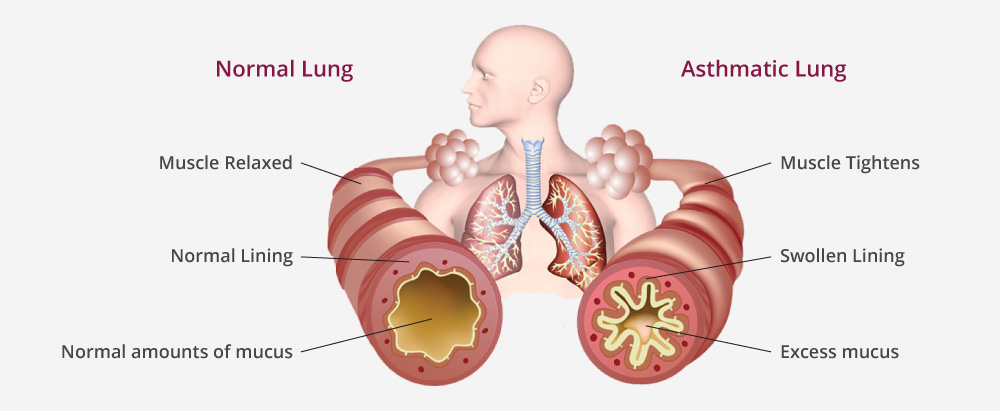Ask yourself this, do you have a regular cough that just doesn’t want to go away? Do you struggle to catch your breath? Is there a whistling or wheezing sound when you breathe? If you answered yes, these can be signs of asthma.1
Ok, so don’t worry, we don’t want to frighten you. Let’s look at all aspects of the condition to get a clearer understanding. Asthma is a long-term (or chronic) disease that affects the airways in the lungs. Unfortunately, there is no cure for asthma and it can affect people of all ages. So the best way to manage asthma is to avoid triggers, follow your Asthma Action Plan to prevent symptoms and be prepared to treat asthma episodes if they occur.2, 3, 4
The only way to not become overwhelmed with knowing you have a condition is to understand exactly what is going on.
Asthma is a long-term (or chronic) disease that affects the airways in the lungs. Your airways carry air in and out of the lungs and they become smaller and smaller as they branch out into the lungs.3, 4
When you suffer from asthma, these airways become over-sensitive to certain things (allergens/triggers) that it would not normally react to. When they come in contact with one of these triggers, the airway lining becomes inflamed and swollen and it starts producing a sticky mucus or phlegm. The phlegm then clogs up the already narrow airway, making it very difficult to breathe. If the swelling is not treated, over time the airway walls may thicken permanently, preventing them from working efficiently. The airway may also react more strongly (such as when they have an asthma attack) by causing the muscles around the airway to tighten, making the airway even narrower, and this is called “bronchospasm”.3, 5
Asthma can affect people of all ages, and although it cannot be cured, it can be controlled.2


To understand why you may have this condition, it’s important to unpack some of the main causes of asthma.
Asthma affects people of all ages, but it most often starts during childhood. In South Africa, more than 20% of children and 10-15% of adults have asthma.2, 6
To date, there is no strong scientific evidence on what specifically causes a person to develop asthma and it could be a single cause or a combination of various causes. What we do know is that asthma often runs in families, therefore there is a genetic link to asthma that makes some people more prone to develop asthma.2, 6
Another cause that has been investigated in detail is tobacco smoke. Mothers that smoke while pregnant expose their unborn child to cigarette smoke while in the womb, as well as in their early years of life. Such a child has a much higher risk of developing asthma symptoms early, while the smoke also interferes with the growth and health of the child’s lungs.3
When kids have lung infections early in life while the immune system is still being developed, it may cause asthma later in life.
Some people develop asthma later in life, and this is called “late-onset” or “occupational” asthma. Occupational asthma develops when a person is exposed to chemicals or dust through their type of work which may damage or irritate the lungs.1, 6
If a person has allergies, there is a good chance they may also develop asthma, although this is not always the case.6

The symptoms a person with asthma experiences are generally seen in a pattern – the symptoms may vary over time; it may also change in intensity. A person with asthma generally experiences more than one symptom at a time; symptoms are often worse at night or on waking, they are often triggered by exercise, laughter, allergens, cold air, pollution or smoke and it often appears or worsens with viral infections.1
For asthma to be properly diagnosed, a doctor needs to run a few tests, look at all the symptoms, patterns of symptoms and the patient’s history. We look at these in more detail in the “Diagnosis” section.
These symptoms include: 1

Asthma is often described as an allergic disease where allergens are thought to trigger an attack. However, it seems that exposure to various other elements not generally regarded allergens may also trigger an attack.1
An asthma attack is often triggered by an external agent, but it may also be due to poor adherence with medication.

Sometimes we jump to conclusions when we are not feeling 100%. The best is to stay calm and allow a professional to do a thorough diagnosis.
It is possible that as many as 50% of asthma cases may be undiagnosed.1
For your doctor to diagnose you, there are 3 things he will consider:1, 8

Although we know that cigarette smoke, allergies, exposure to chemicals and dust at work could possibly cause asthma, there are other factors that may increase your risk of developing asthma.
These include:2